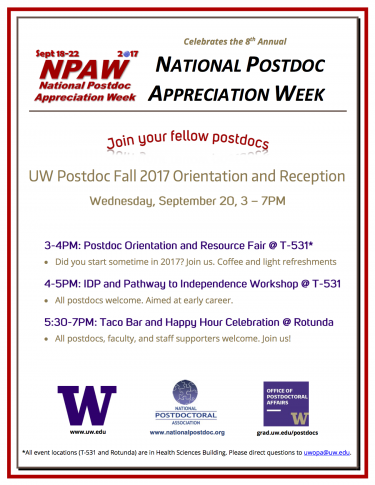We understand it can feel daunting to find funding sources for postdocs, and that NIH or NSF mechanisms can be highly competitive and slow to respond. The Office of Postdoc Affairs worked with our UW Graduate Funding Information Service (GFIS) to identify additional mechanisms for postdocs or early career researchers. We found these mechanisms can include non-profits, corporations, professional and academic associations, foundations, and government agencies. These tips and links below will be archived in a blogpost on our OPA website for future reference – we highly recommend checking some of these out!
Search in specialized funding databases. More strategic and specific than a Google search, these resources can surface new-to-you funding opportunities. Be sure to look in more than one place (in addition to consulting your network!), as there is no single, comprehensive postdoctoral funding database.
SciVal Funding This powerful funding database is geared toward upper-level doctoral students, postdocs, and faculty researchers. Covering many disciplines, SciVal Funding allows you to search across funding opportunities from government, non-profit, corporate, and other sources. This database indexes the abstracts of successfully-awarded grants, and UW users can create a profile, allowing them to export results and set up search alerts. Requires UW NetID login.
UCLA GRAPES The UCLA Graduate and Postdoctoral Extramural Support (GRAPES) Database is an open resource aggregating a variety of external funding opportunities, not only opportunities available for UCLA students. This is a growing and up-to-date funding database, and postdoctoral funding is easily targeted through the “Academic Level” filter on the left-hand side of the page.
Grant Forward More easily searchable than SciVal Funding, Grant Forward offers UW users an additional funding resource, with features including results exporting and search alerts. Grant Forward (formerly called IRIS) offers broad disciplinary coverage. Postdoctoral opportunities are best found by applying the “Early Career Investigator” applicant type filter or by using postdoc* as a search term. Requires UW NetID login.
Harvard Guide Harvard’s GSAS Postdoctoral Fellowships database enables searching by academic area, citizenship, career stage, geographic location, fellowship duration, application deadline, and more. Tips for searching the database help ensure you get the results you’re looking for.
Select External Funding Opportunities
All Postdocs Regardless of Citizenship Amazon Catalyst Grants Amazon Catalyst at the University of Washington provides students, faculty, and staff of all trades, fields, and disciplines with funding (from $10,000 to $100,000) and mentorship to help them grow early-stage ideas into successful endeavors.
Christine Mirzayan Science & Technology Policy Graduate Fellowship Program Provides early career individuals with the opportunity to spend 12 weeks at the Academies in DC learning about science and technology policy and the role that scientists and engineers play in advising the nation.
Dan David Prize Scholarships to registered doctoral and post-doctoral researchers studying at recognized universities throughout the world and doing research in one of the selected fields for the year in which the application is made.
DataONE Summer Internship Program DataONE offers summer research internships for undergraduates, graduate students and recent postgraduates. DataONE is a virtual organization dedicated to providing open, persistent, robust, and secure access to biodiversity and environmental data.
Google Travel & Conference Grants These grants are available to traditionally underrepresented groups in technology (including, but not limited to, African Americans, Hispanics, Native Americans, persons with disabilities, women, and veterans) for selected conferences in Computer Science and related technical fields.
Helen Hay Whitney Foundation Research Fellowships 3-year fellowship to support early postdoctoral research training in all basic biomedical sciences. Annual $50,000+ stipend and $1,500 research allowance.
Kluge Fellowships at the Library of Congress 4-11 months of research support to enable use of the Library of Congress collections, with a stipend of $4,200 per month. Recipients of terminal advanced degree within the past several years in the humanities, social sciences, or in a professional field such as architecture or law are eligible.
U.S. Citizens & Permanent Residents Only
CAORC Multi-Country Research Fellowship Supports advanced regional or trans-regional research in the humanities, social sciences, or allied natural sciences for U.S. doctoral candidates and scholars. Awards of up to $10,500. Other fellowships also available.
Ford Foundation Postdoctoral Fellowship Program Fellowships including a $45,000 stipend for individuals committed to a career in teaching and research.
Fulbright Postdoctoral Scholar Awards Open to U.S. scholars who have recently completed their doctoral degree, typically within the 5 previous years. Awards are available in STEM fields, the arts, humanities, and social sciences.
Reed Foundation Ruth Landes Memorial Research Fund $10,000 to $60,000 per year for research, including field studies and related expenses. Areas of supported research include, but are not limited to, aging, gender and sexuality, race and ethnicity, immigrant and minority populations, culture and education, language and identity, and religion.
Acknowledgement to Rachel Wishkoski, former Graduate Funding Information Services (GFIS) Manager who contributed greatly to the above list.
Originally posted on July 21, 2016.
